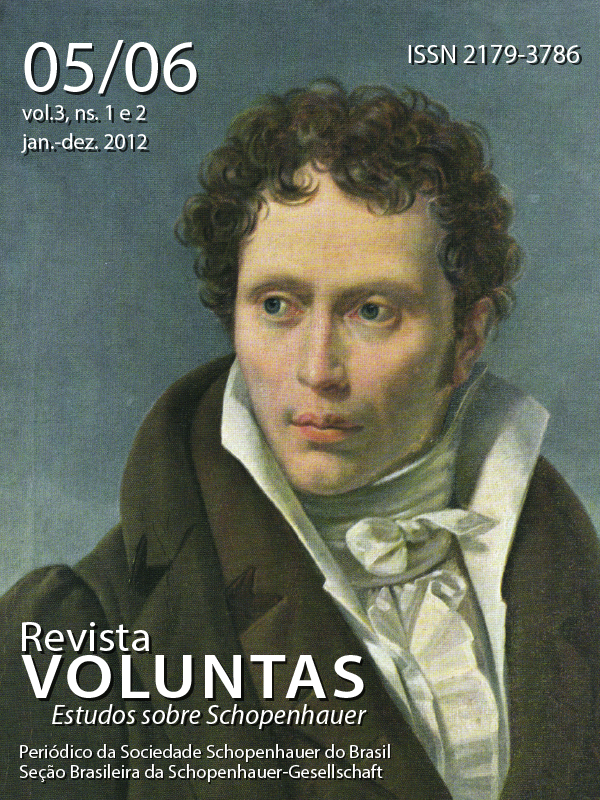The Proximity of Genius and Madness: A Study of Schopenhauer's Aesthetics
DOI:
https://doi.org/10.5902/2179378634028Keywords:
Aesthetics, Madness, Artistic geniusAbstract
Schopenhauer's treatment of aesthetics forms one of the central aspects of his wider philosophical world-view. Although the treatment is both insightful and sensitive, the analysis of the creative genius connects it to the more peripheral examination of madness in a way that threatens to undermine Schopenhauer's conception of the self. Madness is characterised by discontinuity of an individual's self, inviting a comparison with the transition into pure subjectivity from everyday empirical subjectivity during aesthetic contemplation. A comparison to madness is even more relevant to the genius, whose exposure to the sublime elements of nature parallels the madman's exposure to the horrific. By comparing the principle of madness with that of the aesthetic state, that which preserves our identity throughout our change in subjectivity can be brought into question. As Schopenhauer argues our knowledge of the Will is insufficient, an appeal to this as the source of continuity is unsatisfactory.Downloads
References
ATWELL, J. E., ''Art as liberation: a central theme of Schopenhauer's philosophy''. In: Dale Jacquette
(ed.) Schopenhauer, Philosophy and the Arts. Cambridge: Cambridge University Press, 1996, pp. 81-106.
GARDNER, S., ''Schopenhauer, Will, and the Unconscious''. In: The Cambridge Companion to Schopenhauer, by Christopher Janaway (ed.). cambridge: Cambridge University Press, 1999, pp. 375-421.
GARDINER, P. Schopenhauer. Harmondsworth: Penguin Books, 1963.
GUYER, P. ''Pleasure and knowledge in Schopenhauer's aesthetics''. In: Dale Jacquette (ed.), Schopenhauer, Philosophy and the Arts. Cambridge: Cambridge University Press, 1996, pp. 109-132.
JACQUETTE, D. The Philosophy of Schopenhauer. Cesham: Acumen Publishing Limited, 2005.
JACQUETTE, D. ''Schopenhauer's metaphysics of appearance and Will in the philosophy of art''. In:
Dale Jacquette (ed.), Schopenhauer, Philosophy and the Arts. Cambridge: Cambridge University Press, 1996, pp. 1-36.
JANAWAY, C. ''The real essence of human beings: Schopenhauer and the unconscious will''. In: Angus Nicholls and Marting Liebscher (eds.), Thinking the Unconscious: Nineteenth-Century German Thought. Cambridge: Cambridge University Press, 2010, pp. 140-155.
KRUKOWSKI, L. ''Schopenhauer and the aesthetics of creativity''. Cambridge University Press, 1996, pp.62-80.
MAGEE, B. The Philosophy of Schopenhauer. New York: Oxford University Press, 1983.
SCHOPENHAUER, A. The World as Will and Representation. 2 vols. E. F. J. Payne, trans. New York:
Dover Publications, 1966.
SCHOPENHAUER, A.On the Fourfold Root of the Principle of Sufficient Reason. E. F. J. Payne, trans. LaSalle: Open Court Publishing Co., 1974.
SCHOPENHAUER, A. On the Freedom of the Will. K. Kolenda, trans. Oxford: Basil Blackwell, 1985.
YOUNG, J. Willing and Unwilling: A Study in the Philosophy of Arthur Schopenhauer. Dordrecht:
Martinus Nijhoff Publishers, 1987.
Downloads
Published
How to Cite
Issue
Section
License
The submission of original manuscripts to this journal implies the transference, by the authors, of the copyrights for printed and digital publication. The copyrights of a published manuscript belong ultimately to the author, and only the copyright for its first publication is reserved to the journal. Authors may only use the same results in other publications explicitly indicating this journal as the medium of the original publication.
Licence
Attribution-NonCommercial-ShareAlike 4.0 International (CC BY-NC-SA 4.0) - This license lets others remix, tweak, and build upon your work non-commercially, as long as they credit you and license their new creations under the identical terms.






